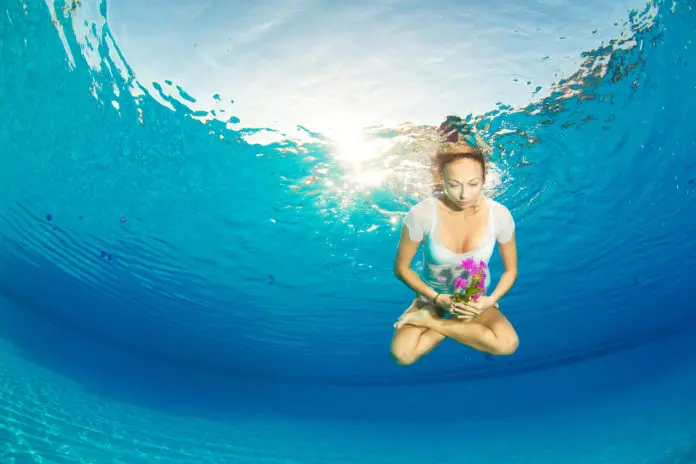People all around the world freedive for many different reasons. For some, it’s a way to provide food for their communities, such as the Japanese Ama or the Malaysian/Indonesian Badjao. For travelers, it can be something new and exciting to try on vacation to help them expand on their snorkeling skills. For athletes, it may be a sport that challenges them, driving them to go deeper in the ocean or farther in the pool, and compete for national records. Yet what some may not know is that freediving provides tons of health benefits to those who incorporate it into their lives.
Stress-relief
One of the most important parts of freediving is relaxation. A good, safe dive involves being completely relaxed before, during, and after a dive, which keeps our oxygen consumption rate low, protects our bodies from injury, and makes our dives longer and more pleasurable. Freediving courses and theory focus on meditation techniques, relaxation exercises, and separating real-world stress from your training in the water. A 2013 study even showed that “free diving athletes obtained lower scores in the state anxiety, stress symptoms, and negative affectivity as compared to the non-athletes.”
Beneficial for joints
While many land-based sports are stressful on your joints, activities that take place in the water can relieve joint pressure, reduce swelling, and even increase their range of motion. This is due to hydrostatic pressure being exerted over your whole body from the weight of being underwater, which counteracts the usual pressure your body faces during high-impact activities.
Increased flexibility
Diving deeper requires rib cage and diaphragm flexibility to help with taking a bigger breath and to avoid injuries at depth. Stretches to help thoracic flexibility are usually taught in intermediate and advanced freediving courses, along with full-body stretches before open water sessions to minimize the risk of injury. Some freedivers also practice yoga in order to stay in shape and work on their flexibility.
More self-confidence
Freediving courses really focus on confidence. Confidence before, during, and after your dives are important for safety, relaxation, and for a good dive in general. The 2013 study results referred to above also states that freedivers had higher self-confident coping strategies and a higher belief in the internal locus of control (a psychological concept referring to how much people believe they have control over experiences and situations that influences their lives).
Better water safety
Freediving courses make safety a priority, showing students how to train safely in their own sessions (always with a buddy!), how to deal with a loss of fin or mask, and how to function in rescue scenarios. The more confident you are in the water, the more likely you will be to spot risky situations before they occur, avoid panic if a risky situation does occur, and help someone who might be in trouble.
Improved focus
When you work towards achieving a goal, it requires a great deal of your concentration and focus. With freediving, there is always a goal to work towards, whether it is depth, distance, relaxation, more efficient equalization, focusing on a different discipline, etc. It is a sport that requires continuous effort, determination, and constantly being in tune with your body and mental state.
Increased oxygen efficiency
Oxygen efficiency is a staple part of freediving in order to prolong our dives. We constantly activate our body’s mammalian dive reflex, which triggers our bodies to use oxygen more efficiently. Deep divers who train extensively have even been shown to have similar blood composition to those who live in high altitudes.
Improved fitness
Freediving requires tons of movement: swimming out to a dive site, performing safety, setting the line, various depth, and dynamic disciplines, etc. Apart from all of this physical movement, freedivers often train outside of the water in order to improve their strength cardiovascular fitness, such as practicing yoga or going to the gym.
Increased lung function
Freediving requires us to work on filling our lungs to their maximum capacity, which is something that many non-divers do not know how to do. With a great deal of practice and various types of stretches/exercises, freedivers increase their lung capacity and strength.
Better nutrition
What you eat, especially the night before or the morning of a training session, matters in freediving. Large meal portions before getting in the water will make freediving very difficult, dairy products can cause increased mucus production (affecting equalization), and caffeine will make your heart race and your body consume oxygen faster. People who freedive seriously often will focus on their nutrition in order to optimize their performance.
Do you know any other health benefits that come from freediving? Let us know in the comments below!

